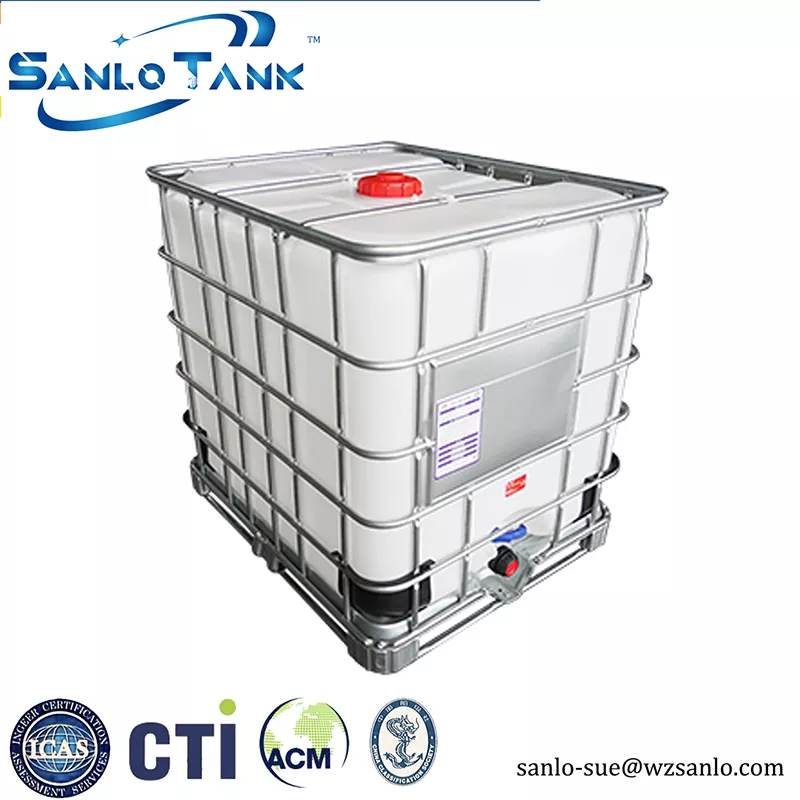What Materials Are IBC Tanks Made of?
2025-11-10
IBC Tanks are essential for storing and transporting liquids and chemicals efficiently. Understanding what materials IBC Tanks are made of helps in selecting the right product for specific industrial or commercial applications. At Wenzhou Sanlo International Trade Co., Ltd., our factory specializes in producing durable and high-performance IBC Tanks suitable for diverse needs.
1. Overview of IBC Tank Materials
IBCs, or Intermediate Bulk Containers, are manufactured using a variety of materials depending on the intended use, chemical compatibility, and storage conditions. Our IBC Tank range includes options made from high-density polyethylene, stainless steel, carbon steel, and composite materials. Our factory ensures each material meets rigorous quality standards for strength, durability, and safety.
| Material | Description | Common Uses | Advantages | Limitations |
| High-Density Polyethylene (HDPE) | Durable plastic resistant to most chemicals | Water, chemicals, food ingredients | Lightweight, corrosion-resistant, UV-resistant | Not suitable for high-temperature liquids |
| Stainless Steel (304 / 316) | Corrosion-resistant metal alloy with excellent strength | Chemicals, food-grade liquids, pharmaceuticals | Durable, easy to clean, hygienic | Higher cost, heavier than plastic |
| Carbon Steel | Strong metal with protective coating for durability | Industrial chemicals, oils, solvents | High strength, can handle high temperatures | Prone to corrosion if coating is damaged |
| Composite Materials | Combination of plastic liner and metal cage | Chemicals, hazardous liquids, transport | Lightweight, strong, resistant to impact | Limited chemical compatibility in some cases |
At Wenzhou Sanlo International Trade Co., Ltd., our factory focuses on providing IBC Tanks with precise material composition to ensure safety, reliability, and long service life. Our products are widely used in chemical, food, and industrial sectors.
2. Factors to Consider When Choosing IBC Tank Materials
Choosing the appropriate material for an IBC Tank requires evaluating several factors: the type of liquid, storage environment, temperature range, and transportation needs. Our team provides guidance on material selection to match specific applications and ensure compliance with safety regulations.
For example, HDPE tanks are ideal for water-based solutions and mild chemicals, while stainless steel tanks are preferred for corrosive chemicals and food-grade applications. Our factory ensures that each IBC Tank is manufactured with precision to meet industrial and safety standards.
3. Detailed Product Specifications
Our IBC Tank products come in multiple sizes, capacities, and designs. The following table summarizes the key specifications to assist buyers in selecting the right model.
| Model | Material | Capacity | Dimensions (LxWxH) | Maximum Temperature | Special Features |
| IBC-1000L-HDPE | HDPE | 1000L | 1200x1000x1160mm | 60°C | UV-stabilized, lightweight |
| IBC-1000L-SS304 | Stainless Steel 304 | 1000L | 1200x1000x1160mm | 100°C | Hygienic, corrosion-resistant |
| IBC-1000L-CS | Carbon Steel | 1000L | 1200x1000x1160mm | 120°C | High-strength, coated surface |
| IBC-1000L-Composite | HDPE liner + Steel Cage | 1000L | 1200x1000x1160mm | 80°C | Impact-resistant, stackable |
Our factory at Wenzhou Sanlo International Trade Co., Ltd. implements strict quality control for dimensions, material thickness, and chemical resistance, ensuring every IBC Tank meets international standards.
4. Maintenance and Safety Tips
Proper care extends the life of an IBC Tank. Always clean the tank after each use with compatible cleaning agents, avoid exposing plastic tanks to high temperatures for extended periods, and inspect metal tanks for signs of corrosion. Our team provides comprehensive maintenance guides to ensure optimal performance of every product.
Our factory emphasizes safety during manufacturing, shipping, and storage. At Wenzhou Sanlo International Trade Co., Ltd., our IBC Tanks are designed to meet strict safety and regulatory standards to protect both products and personnel.
FAQs About "What Materials Are IBC Tanks Made of?"
Q1: Which material is best for storing chemicals in IBC Tanks?
A1: Stainless steel 316 is highly recommended for corrosive chemicals due to its superior resistance to acids and alkalis. Our factory produces both stainless steel and HDPE models, ensuring safe storage options for various chemicals.
Q2: Can HDPE IBC Tanks be used for food-grade applications?
A2: Yes, HDPE tanks certified for food-grade use are suitable for storing liquids like water, juice, or edible oils. Our IBC Tanks from Wenzhou Sanlo International Trade Co., Ltd. meet relevant food safety standards.
Q3: What are the main advantages of composite IBC Tanks?
A3: Composite tanks combine a plastic liner and steel cage, offering impact resistance, light weight, and easy handling. Our factory ensures each composite tank is manufactured with high-quality materials to withstand transport and repeated use.
Conclusion
Understanding what materials IBC Tanks are made of is crucial for ensuring durability, safety, and proper storage of liquids. Our IBC Tank range at Wenzhou Sanlo International Trade Co., Ltd. provides reliable solutions across industrial, chemical, and food sectors. With careful material selection, quality manufacturing, and ongoing support from our factory, customers can confidently choose IBC Tanks that meet their operational and regulatory requirements.



